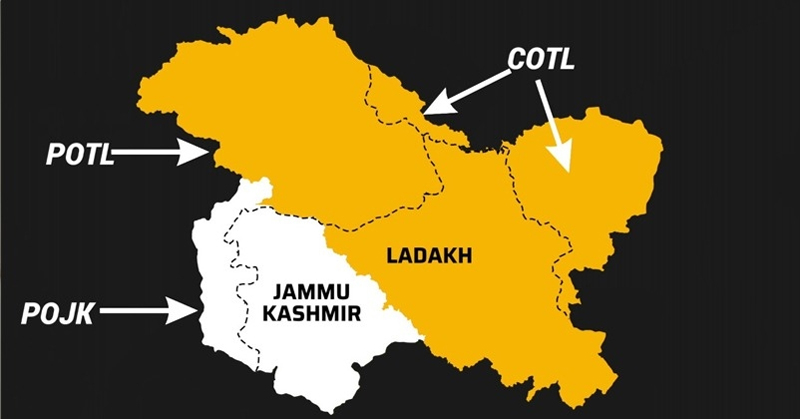*‘Area, seats of PoJK excluded for delimiting segments’
BJP, refugee bodies are in favour of opening constituencies
Sanjeev Pargal
JAMMU, July 7: The Delimitation Commission set up for delimitation of Assembly constituencies in the Union Territory of Jammu and Kashmir has ruled out de-freezing one-third of 24 seats reserved for Pakistan occupied Jammu Kashmir (PoJK) for displaced persons of PoJK settled in India, a demand the Bharatiya Janata Party (BJP) is going to raise during its meeting with the Commission here tomorrow.
The BJP, organizations of PoJK refugees and some other bodies have repeatedly been demanding that one-third of 24 seats reserved for PoJK should be de-freezed and allotted to the PoJK refugees settled in Jammu for more than 70 years. BJP senior leader Kavinder Gupta had a day before stated that the party delegation in its meeting with the Delimitation Commission at Jammu on Thursday will demand de-freezing of 35 percent seats reserved for PoJK for the residents of PoJK who had migrated and were living here for past seven decades.
The Delimitation Commission has made its stand clear in a reply given to a PoJK refugee through the Right to Information Act (RTI).
“Twenty four seats in the Legislative Assembly of Union Territory of Jammu and Kashmir shall remain vacant and shall not be taken into account for reckoning the total membership of the Assembly. The said area and seats shall be excluded in delimiting the territorial constituencies as provided under Part V of the Act,” the Delimitation Commission has said.
In view of this, it said, the request for de-freezing one-third of 24 seats reserved in Jammu and Kashmir Assembly for PoJK for the displaced persons of PoJK settled in India can’t be acceded to.
The Delimitation Commission’s rejection of the demand for de-freezing one-third of seats reserved for PoJK assumed significance in view of demand from the BJP, various PoJK bodies and some other organizations that one-third of 24 seats should be allotted to displaced persons from the PoJK settled at several places in Jammu.
While bifurcating erstwhile State of Jammu and Kashmir into two Union Territories of J&K and Ladakh, the Union Ministry of Home Affairs had allocated 114 seats Assembly to J&K while Ladakh wasn’t granted the Legislature. Out of 114 seats, 24 have been reserved for PoJK and elections will be held on 90 seats in Jammu and Kashmir.
Earlier, number of the Assembly seats in Jammu and Kashmir was 111 including 87 on which election used to be held while 24 were reserved for PoJK. With Ladakh exiting from Jammu and Kashmir and becoming a separate Union Territory, four Assembly seats of erstwhile Ladakh division were reduced bringing down number of Assembly seats to 83. Increase of seven seats has taken number of seats on which the election will be held to 90.
The Delimitation Commission is presently on a four-day visit of Jammu and Kashmir from July 6 to 9 during which it will meet political parties and many delegations besides all 20 Deputy Commissioners of the Union Territory to take their view point, data and other information required for delimitation of 90 Assembly constituencies.
The Commission has been mandated to delimit the constituencies of the Union Territory in accordance with the provisions of Part V of Jammu and Kashmir Reorganization Act, 2019 and Delimitation Act, 2002.
In the previous Assembly, Kashmir had 46 seats, Jammu 37 and Ladakh four.
Delimitation of the Assembly constituencies was last held in 1994-95 during the President’s Rule when seats of the erstwhile State Assembly were raised from 76 to 87. Jammu region’s seats were increased from 32 to 37, Kashmir’s from 42 to 46 and Ladakh’s two to four. However, the delimitation was freezed in 2002 by the then National Conference Government headed by Dr Farooq Abdullah in lines with the decision taken by then Central Government headed by Atal Bihari Vajpayee.
Elections to the Legislative Assembly will be held only after delimitation of Assembly constituencies is completed.
The delimitation of Assembly seats has become necessity as it would be treated as new Assembly altogether with reservation for Scheduled Castes and Scheduled Tribes. The Scheduled Castes enjoyed reservations in the previous State Assembly also where seven constituencies were reserved for them including Chhamb, Domana, RS Pura, Samba, Hiranagar, Chenani and Ramban, all in Jammu region, while STs had been denied political reservations.
“The STs will get political reservations for the first time in the history of Jammu and Kashmir,” sources pointed out.
It may be mentioned here that seats reserved for SCs had to be rotated after every two terms but in the erstwhile J&K State Assembly, four elections were held on the same reserved seats without rotating them. The Delimitation Commission could now reserve seats in different areas for the SCs, they said.


